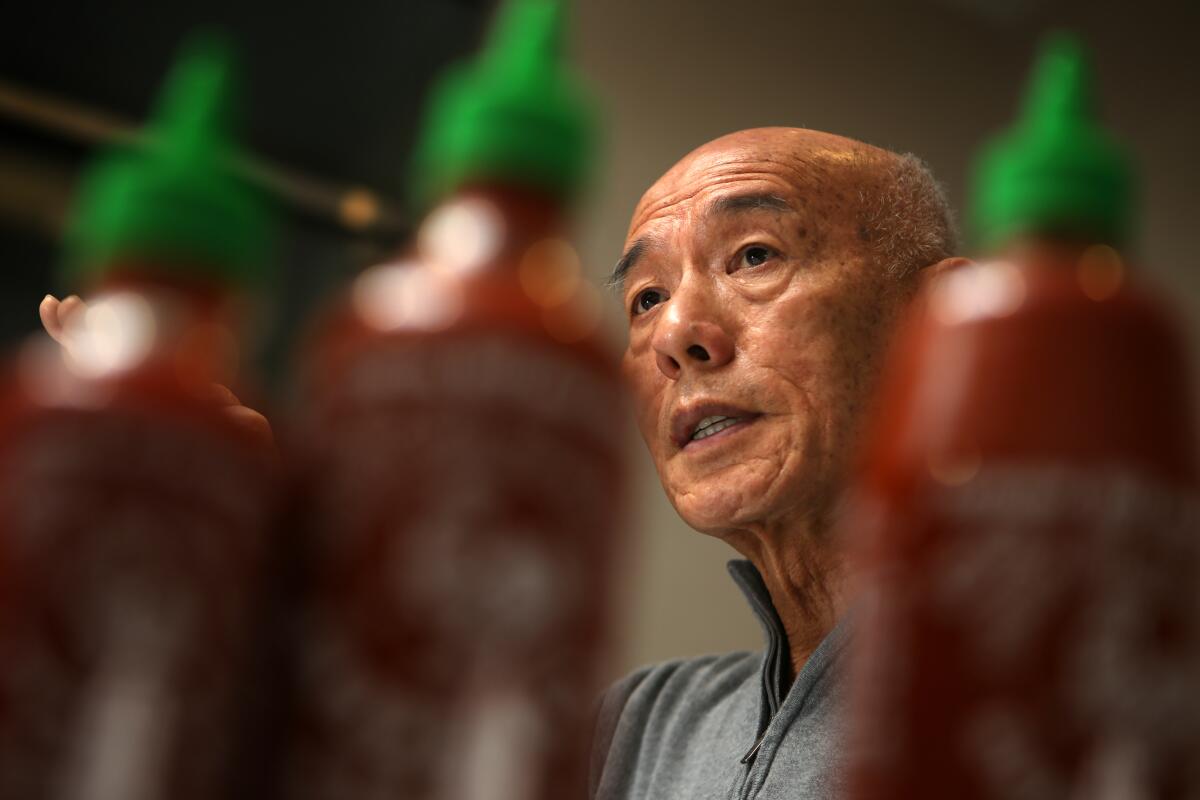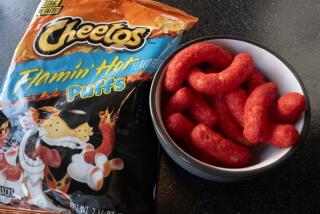With no trademark, Sriracha name is showing up everywhere

Wander down almost any supermarket aisle and it’s easy to spot one of the food industry’s hottest fads. Sriracha, the fiery red Asian chili sauce, has catapulted from a cult hit to flavor du jour, infusing burgers, potato chips, candy, vodka and even lip balm.
That would seem like a boon for the man who made the sauce a household name. Except for one glaring omission.
David Tran, a Vietnamese refugee who built the pepper empire from nothing, never trademarked the term, opening the door for others to develop their own sauce or seasoning and call it Sriracha.
That’s given some of the biggest names in the food business such as Heinz, Frito-Lay, Subway and Jack in the Box license to bank off the popularity of a condiment once named Bon Appétit magazine’s ingredient of the year.
Restaurant chains and candy and snack makers aren’t buying truckloads of Tran’s green-capped condiment emblazoned with the rooster logo. Nor are they paying Tran a dime in royalties to use the word “Sriracha” (pronounced “see-RAH-cha”).
“In my mind, it’s a major misstep,” said Steve Stallman, president of Stallman Marketing, a food business consultancy. “Getting a trademark is a fundamental thing.”
Tran, who now operates his family-owned company Huy Fong Foods out of a 650,000-square-foot facility in Irwindale, doesn’t see his failure to secure a trademark as a missed opportunity. He says it’s free advertising for a company that’s never had a marketing budget. It’s unclear whether he’s losing out: Sales of the original Sriracha have grown from $60 million to $80 million in the last two years alone.
“Everyone wants to jump in now,” said Tran, 70. “We have lawyers come and say ‘I can represent you and sue’ and I say ‘No. Let them do it.’”
Tran is so proud of the condiment’s popularity that he maintains a daily ritual of searching the Internet for the latest Sriracha spinoff.
He believes all the exposure will lead more consumers to taste the original spicy, sweet concoction — which was inspired by flavors from across Southeast Asia and named after a coastal city in Thailand. Tran also said he was discouraged to seek a trademark because it would have been difficult getting one named after a real-life location.
That hasn’t stopped competitors from scratching their heads.
Tony Simmons, chief executive of the McIlhenny Co., makers of Tabasco, said Tran’s Sriracha sauce was the “gold standard” for Sriracha-style sauces, which has largely come to mean any dressing that packs a piquant punch of chili paste, vinegar, garlic and sugar.
Simmons was reassured by his lawyers that Tabasco would have no problem releasing a similar sauce using the name Sriracha.
“We spend enormous time protecting the word ‘Tabasco’ so that we don’t have exactly this problem,” Simmons said. “Why Mr. Tran did not do that, I don’t know.”
There are now a slew of sauces on the market labeled Sriracha, including variations by Frank’s Red Hot, Kikkoman and Lee Kum Kee.
The category has helped ignite U.S. hot sauce sales, which have jumped from $229 million in 2000 to $608 million last year, according to Euromonitor.
“What we’re seeing among consumers is demand, not just for heat, but more complex, regional flavors,” said Beth Bloom, a food and drink analyst for Mintel. “With Sriracha, Huy Fong introduced a new style and a whole new category of hot sauce.”
Although Taco Bell and Pizza Hut are some of the latest national brands to experiment with their own Sriracha seasoning in tacos, nachos and pizza sauce, it’s Tabasco’s that has Tran admittedly sweating.
“My ‘rooster killer’ jumped into the market,” said Tran, borrowing a description he saw on a food blog. “They’re a big company. They have a lot of money and a lot of advertising.”
Simmons isn’t counting on toppling Sriracha any time soon.
“Mr. Tran got an awful big head start,” he said.
After a limited release, Tabasco will distribute its Sriracha sauce nationwide sometime in the first quarter of this year, Simmons said.
It may be too late for Tran to successfully argue that the trademark belongs to him.
Two dozen applications to use the word have been filed with the United States Patent and Trademark Office. None has been granted for Sriracha alone. The word is now too generic, the agency determined.
“The ship has probably sailed on this, which is unfortunate because they’ve clearly added something to American cuisine that wasn’t there before,” said Kelly P. McCarthy, a partner and expert on brand protection and trademark issues at the law firm Sideman & Bancroft.
She said it’s not uncommon for popular products to lose their trademarks because they’ve become “genericized,” such as Otis Elevator Co.’s use of “escalator” and Bayer AG’s loss of “aspirin.”
Tran’s attorney isn’t so sure the same applies to Sriracha.
Rod Berman, who was primarily retained 10 years ago to tackle counterfeiters, thinks many consumers still associate Sriracha with Huy Fong. He cited the mountain of publicity, films and growing sales as evidence.
“My instinct is to want to go after the people that used the Sriracha name,” said Berman, an intellectual property lawyer who has represented the Los Angeles Lakers, Pom Wonderful and Nordstrom.
But that’s not realistic, he says, especially for a medium-size company like Huy Fong.
“Large companies, the Mattels and Disneys of the world, try to protect everything and have the budget for that,” Berman said. “With smaller enterprises like Huy Fong, you have to pick and choose.”
That’s why Tran has gone after knockoffs of Huy Fong’s Sriracha from China. Unlike the name, Tran trademarked his rooster logo and distinctive bottle.
At the same time, Tran has signed licensing agreements with a handful of specialty producers such as Rogue, which brews a Sriracha hot stout beer packaged in a red bottle and green cap to look like Huy Fong’s signature sauce, and Pop Gourmet, which makes a Sriracha popcorn and will soon release a Sriracha seasoning spice.
Even with these partnerships, Tran doesn’t charge any royalty fees. All he asks is that they use his sauce and stay true to its flavor.
“I wanted to bring people the real stuff,” said David Israel, chief executive of Pop Gourmet in Kent, Wash.
The Sriracha popcorn is the company’s No. 1 seller, and Israel has high hopes for the new seasoning, which took nine months to develop.
For the Rogue stout, Sriracha is added during the fermentation process. The beer quickly sold out.
“We could have gone and just used Huy Fong’s sauce, but we also wanted to use their name” and logo, said Brett Joyce, president of the Newport, Ore., company.
Randy Clemens, author of “The Sriracha Cookbook” and “The Veggie-Lover’s Sriracha Cookbook,” said the licensed products preserve Huy Fong’s flavor, unlike the mass-market efforts.
“A little kick, but to put Sriracha in the title is a little disingenuous,” Clemens said. “What makes the original so great is that it’s bold and kicks you in the face.”
Tran agreed his imitators fall short in flavor and spice, but like the trademark, he isn’t losing any sleep over it.
“David is fine with that since in some indirect way, we will still reap the benefit of the word ‘Sriracha’ being used,” said Donna Lam, Tran’s longtime deputy. “We seem to be the best-known Sriracha out there, and everyone seems to use our brand as the gold standard. If anything, we are proud we started the Sriracha craze.”
More to Read
Inside the business of entertainment
The Wide Shot brings you news, analysis and insights on everything from streaming wars to production — and what it all means for the future.
You may occasionally receive promotional content from the Los Angeles Times.











